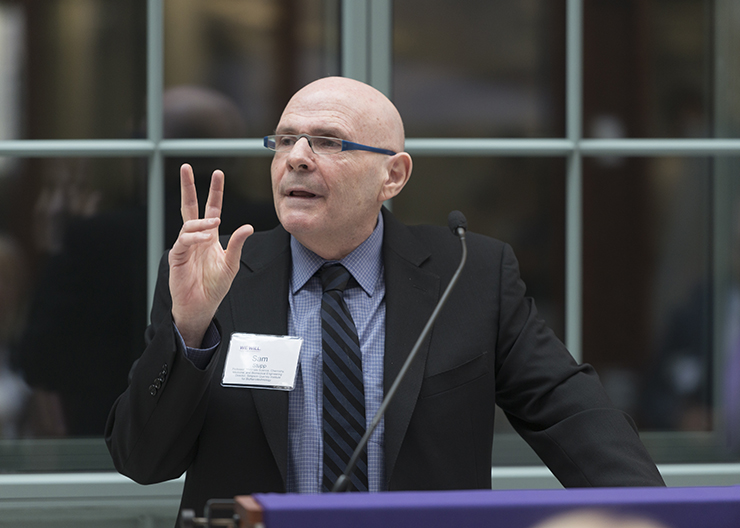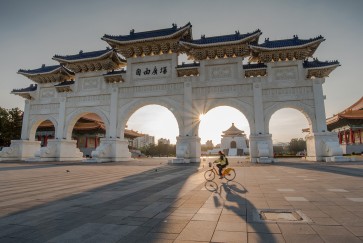Northwestern University celebrated the expansion of the Simpson Querrey Institute for BioNanotechnology (SQI) from its Chicago campus to a second location in the heart of the Evanston campus at a ribbon-cutting ceremony held Saturday, Aug. 19. SQI strives to solve society’s most difficult medical and energy challenges through research at the intersection of bioengineering and nanoscience.
SQI is one of many Northwestern initiatives made possible by University trustees Louis A. Simpson ’58 and Kimberly K. Querrey. Others include the institute’s Louis A. Simpson and Kimberly K. Querrey Center for Regenerative Nanomedicine; the Louis Simpson and Kimberly Querrey Professorship in Materials Science and Engineering, Biomedical Engineering and Medicine; and the forthcoming Louis A. Simpson and Kimberly K. Querrey Biomedical Research Center.
More than 100 trustees, faculty, staff, students, alumni and other University supporters attended the ceremony honoring the couple for their generosity. SQI’s new space is in the Technological Institute, where the ribbon-cutting was held.
In his remarks honoring Querrey and Simpson, Northwestern President Morton Schapiro told them, “You have supported science at Northwestern at a level that is unprecedented in our history, and my dream and hope is that you will take great pleasure for many years in the discoveries that your philanthropy has made possible.”
At the ceremony, SQI Director Samuel I. Stupp shared that the institute “has undergone a very intense expansion into new areas of research” and announced the creation of two new centers within SQI. The Center for Bio-Inspired Energy Science, presently supported by the U.S. Department of Energy, which aims to discover and develop bio-inspired materials and devices relevant to energy challenges, and the Center for Bio-Integrated Electronics, which develops new biocompatible forms of electronics of critical relevance to human health, join the Simpson Querrey Center for Regenerative Nanomedicine, which focuses on the use of nanotechnology in regenerative medicine.
“These new centers will grow here in this very special place, and we hope that they will lead to great things,” said Stupp, Board of Trustees Professor of Materials Science and Engineering, Chemistry, Medicine and Biomedical Engineering.
Noting the pervasiveness and vast potential of the work being done at the institute, Stupp shared his vision for SQI as a world-renowned institute. “We will work to integrate all science so that we can create platforms that will change the way we live and help us face our most important challenges in medicine, manufacturing, energy and many other fields with advancements inspired by biology,” he said.
Extraordinary supporters of the University, Simpson and Querrey have contributed more than $153 million to Northwestern throughout We Will. The Campaign for Northwestern. They are also members of NU Loyal, the giving society recognizing consistent annual giving to Northwestern, with 11 consecutive years of giving.
The Louis A. Simpson and Kimberly K. Querrey Center for Regenerative Nanomedicine, established in 2012, uses nanoscale technology to seek ways to repair, replace and regenerate tissues and organs. John A. Rogers, a materials scientist and pioneer in the field of bio-integrated electronic devices, joined Northwestern last fall as the Louis Simpson and Kimberly Querrey Professor of Materials Science and Engineering, Biomedical Engineering and Medicine. The Louis A. Simpson and Kimberly K. Querrey Biomedical Research Center -- the future home for breakthrough medical research in areas such as pediatrics, cancer, heart disease, neurodegenerative disorders and genetics on Northwestern’s Chicago campus -- is scheduled for completion in winter 2019.
In addition, the Kimberly K. Querrey and Louis A. Simpson Wing of the forthcoming Walter Athletics Center in Evanston will house a state-of-the-art nutrition center for student-athletes and a dining facility, as well as Northwestern Athletics academic services, student development and compliance departments.
“It’s a great honor to be associated with Northwestern and with what’s happening particularly in medicine and science, and I hope that we will continue to be able to be involved in the future,” said Simpson, an alumnus of the Weinberg College of Arts and Sciences.
Querrey, an engineer by training, called guests’ attention to the “sweat patch,” a biometric monitoring device being developed by John Rogers and his collaborators. The Rogers team demonstrated this device as well as others at the event. She highlighted the patches, which bridge physics, electrical engineering, material science, chemistry and medicine to help monitor the biomarkers in sweat. Devices are also being developed to help with neonatal care and other medical procedures, which are meaningful cross-disciplinary collaborations underway at the University.
“The fact that you bring together scientists and physicians from different disciplines in order to solve a big problem is special to Northwestern,” Querrey said. “Many collaborations are happening at SQI that could be transformative to the human condition.”
Kimberly K. Querrey is president of SQ Advisors, LLC, an investment firm in Naples, Florida. She joined the Northwestern Board of Trustees in 2016. She is also currently Chair of Artis Naples, a member of the Council on Foreign Relations and actively involved with the Big Shoulders Fund.
Louis A. Simpson is chairman of SQ Advisors. He retired as president and chief executive officer, capital operations, of GEICO Corporation in 2010. Simpson was elected to the Northwestern Board of Trustees in 2006. He also serves as a director of VeriSign and trustee emeritus for the Urban Institute and the Museum of Science and Industry. Simpson’s son, Ted, is a 1996 graduate of the Kellogg School of Management.
Simpson and Querrey reside in Naples, Florida.
The funds raised through the “We Will” Campaign are helping realize the transformational vision set forth in Northwestern’s strategic plan and solidify the University’s position among the world’s leading research universities. More information on We Will. The Campaign for Northwestern is available at wewill.northwestern.edu.


